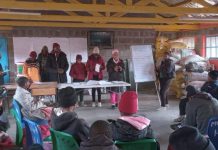Africa-Press – Lesotho. The Constitution of Lesotho was promulgated in 1993. The Constitution provides for fundamental rights of all citizens in Lesotho and Chapter 27 of the Constitution of Lesotho accords protection of health to the citizens.
The chapter calls for adoption of policies to improve environmental and industrial hygiene and the prevention of occupational diseases. Chapter 30 (b) of the Constitution further calls for adoption of policies aimed at securing just and favourable conditions of work; in particular policies directed to achieving safe and healthy working conditions.
Occupational Safety and Health (OSH) administration in the country is fragmented and falls under several public authorities. However, most of the responsibility for promoting safe work lies with the Ministry of Public Service, Labour and Employment.
Lesotho ratified the International Labor Office (ILO) Convention 155 on Occupational Safety and Health (OSH) as well as Convention 167 on Safety and Health in Construction. The ILO Convention 155 calls for member states who have ratified the convention to develop national OSH policies.
The Government of Lesotho (GOL) under the mandate of the Ministry of Public Service, Labour and Employment formulated a National OSH policy, which was endorsed by Cabinet in 2020.
The National OSH policy prescribes that inspections should cover all economic sectors including the informal sector and all workers including self-employed workers.
The main objective of the national OSH policy is to enhance the elimination and prevention of occupational accidents, injuries, diseases and illnesses through the effective role of government, employer organizations and organized labour supported by the National Advisory Council for Occupational Safety, Health and Welfare (NACOSH) based on comprehensive established integrated national organization, arrangements, frameworks and structures.
The GOL also developed a National OSH profile which summarizes the existing situation on occupational safety and health and the progress made towards achieving a safe and health working environment and it covers existing laws, the authority responsible for OSH designated in accordance with national laws and practices and the gaps thereof in relation to the mission outlined in the policy.
To mention a few of the gaps identified in the profile, was the lack of a comprehensive legislation that covers all economic sectors and OSH issues and therefore provided the basis for development of the national OSH Act.
The national OSH Act has been formulated and has listed a non-comprehensive list of regulations that need to be formulated to make it implementable. There are also a number of regulations that have been formulated even though they are outdated and need to be reviewed for relevance to the current labour market needs. Objectives of the assignment
The Southern Africa Tuberculosis and Health Systems Support (SATBHSS) project is being implemented in Lesotho, Malawi, Mozambique, and Zambia to (i) improve the coverage and quality of TB control and occupational lung disease services; and (ii) strengthen regional capacity to manage the burden of TB and occupational diseases.
The AUDA-NEPAD and ECSA-HC provide regional technical support to implement the project with the support of the World Bank. Through the SATBHSS project, the GOL through the Ministry of Public Service, Labour and Employment (MPSLE) was assisted in developing the National OSH Profile, the National OSH Policy and the draft OSH bill which has a list of regulations that have to be formulated to make it enforceable.
The objectives of this assignment are therefore to; i. Formulate regulations that are listed in the draft OSH bill, as well as other regulations that may be deemed pertinent after doing a gap analysis on regulations through a desk review.
ii. Review existing regulations and evaluate the need for revision and relevance to the current Lesotho labour market. Scope of work The consultant shall:
1.On the basis OSH policy, OSH legal landscape in Lesotho, OSH profile and ILO OSH Conventions, comments of the committee of experts on ILO conventions and recommendations, ILO OSH guidelines and the review report on the design and development of OSH legislation in Lesotho identify gaps that would hinder smooth implementation of the draft OSH bill.
2. Review the draft OSH bill and outline all the regulations the draft has made reference to and formulate them, in line with international standards 3. Conduct consultative meetings with relevant stakeholders; line ministries, institutions of higher learning, NGOs of marginalized populations etc.
, for further information to establish existing related regulations to avoid duplication of efforts and to establish areas of concern related to OSH that need to be addressed through regulations.
4. Meet with stakeholder’s i. e. private sector, employers and workers organizations, civil society, informal sector etc, to ensure stakeholder’s buy-in.
5.Present and report to National Advisory Council for Occupational Safety, Health and Welfare (NACOSH) and National Advisory Committee on Labour (NACOLA).
6. The draft OSH regulations will be subjected to validation by stakeholders.
The Ministry of Public Service Labour and Employment (MPSLE) shall facilitate the development of the OSH regulations and shall assist the consultant by providing leadership in ensuring that consultative meetings with key stakeholders take place.
For More News And Analysis About Lesotho Follow Africa-Press






